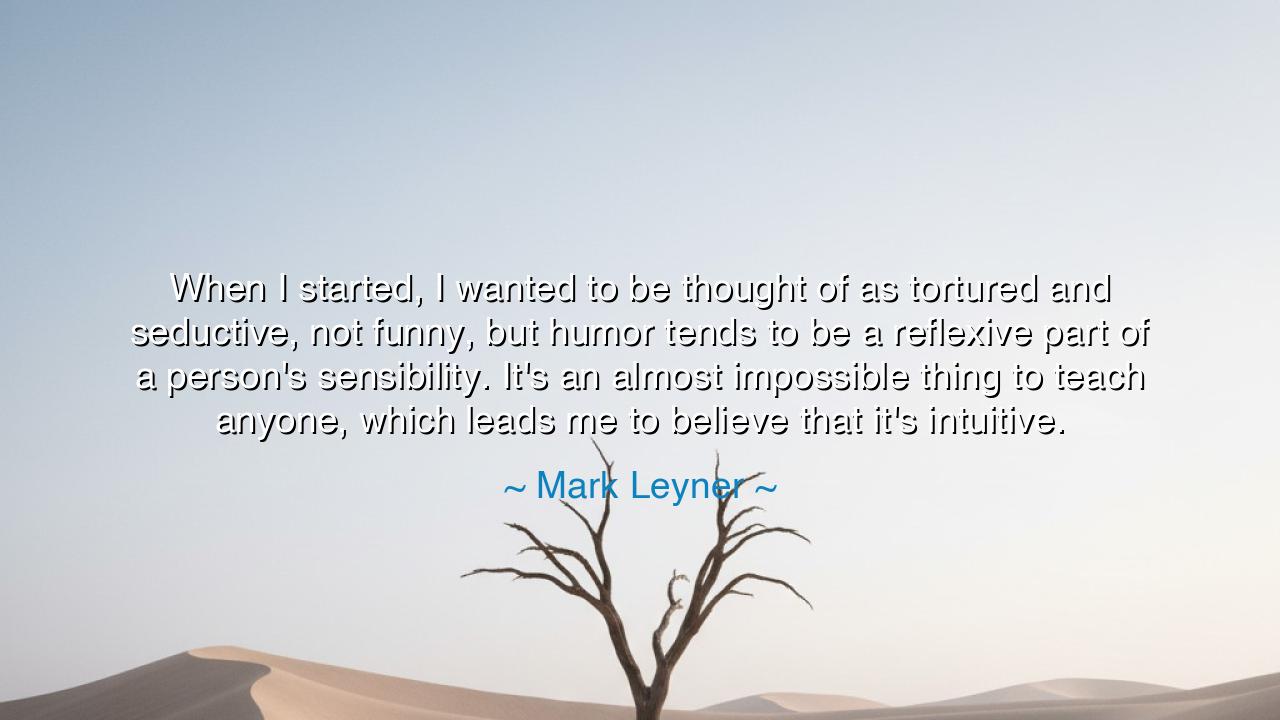
When I started, I wanted to be thought of as tortured and
When I started, I wanted to be thought of as tortured and seductive, not funny, but humor tends to be a reflexive part of a person's sensibility. It's an almost impossible thing to teach anyone, which leads me to believe that it's intuitive.






The writer Mark Leyner once confessed: “When I started, I wanted to be thought of as tortured and seductive, not funny, but humor tends to be a reflexive part of a person’s sensibility. It’s an almost impossible thing to teach anyone, which leads me to believe that it’s intuitive.” These words, humble yet radiant, unveil the eternal struggle between artifice and authenticity, between who we wish to appear and who we truly are. It is the confession of one who sought to sculpt his image like marble — dramatic, tragic, grand — but who found, to his surprise, that his truest self was born not from design, but from instinct, from the intuitive pulse of humor that flowed naturally from within.
When Leyner speaks of wanting to be “tortured and seductive,” he echoes the ancient desire of every artist to be seen as profound, mysterious, and marked by suffering — for suffering has long been mistaken for depth. But humor, that quicksilver of the soul, emerged instead. It was not invited; it arrived unbidden, as lightning finds the tallest tree. And in that revelation — that humor cannot be taught, for it is intuitive — Leyner touches upon a deeper wisdom: that the truest parts of our nature are not crafted, but uncovered. One cannot fake laughter that heals; one cannot imitate wit that springs from the marrow of life.
The ancients understood this. Consider Socrates, who beneath his grave questioning was, at heart, a master of irony — a humorist disguised as a philosopher. When he feigned ignorance before the proud men of Athens, his irony was both playful and profound. It was his intuition, not his intention, that made him wise; his laughter, not his solemnity, that revealed truth. The Athenians sought wisdom in temples and tragedies, yet found it most clearly in the man who could smile while dismantling illusions. Like Leyner, Socrates taught that wit is born of instinct, not instruction.
But why do we resist what is natural to us? Because to embrace the intuitive self requires surrender — a letting go of image, control, and ambition. The artist, like the warrior, must lay down his armor before he can fight with freedom. Leyner began as many do, chasing the shadows of greatness defined by others: the tortured poet, the brooding intellect. Yet through laughter — through his own reflexive humor — he found the truer voice of his spirit. This is the paradox of creation: only when we cease to perform do we begin to express.
Humor, in this sense, is not mere jesting. It is a sacred mirror, revealing life’s absurdity and grace. To laugh, even in despair, is to acknowledge the divine comedy that underlies existence. The ancient Stoics called this acceptance of fate amor fati — the love of one’s destiny. Humor is its living form. It is how the soul bows before chaos without breaking. Leyner’s insight that humor “cannot be taught” is therefore a reminder that the deepest truths are felt, not learned, lived, not lectured.
The lesson of Leyner’s confession is clear: do not strive to be what you are not. The artist who forces an image upon himself will always struggle; the artist who follows his natural rhythm will shine. Whether your gift is wit, empathy, sorrow, or song, cherish it — for it is your signature upon the scroll of the world. What comes unbidden comes from the soul. Intuition is the whisper of your truest self — trust it, for it is wiser than your ambitions.
In practice, this means listening more and pretending less. When you create, speak, or dream, allow your instincts to guide you. Laugh when laughter comes; do not silence it for fear of seeming unserious. For the intuitive spirit knows what the calculating mind forgets — that truth and beauty are often born from spontaneity. Be not ashamed of your natural voice, even if it surprises you. For as Leyner discovered, to embrace one’s humor, one’s unteachable spark, is to return home to the self.
And so, let these words be remembered: Seek not to appear profound — become real instead. For what is real endures beyond fashion and praise. The tortured will be forgotten; the intuitive will live on in every smile, every honest word, every echo of laughter that reminds us: the soul’s truest wisdom often speaks in jest.






AAdministratorAdministrator
Welcome, honored guests. Please leave a comment, we will respond soon